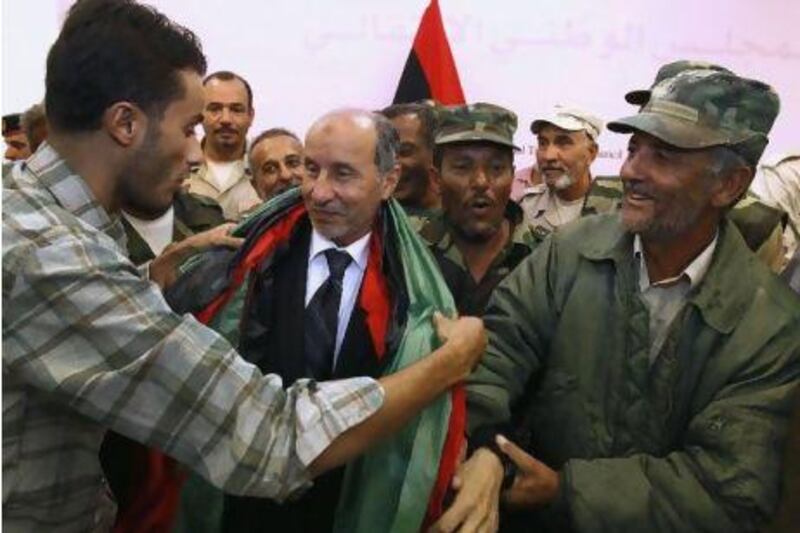TRIPOLI // A debate set off yesterday about the role of religion in the new Libyan state after the "liberation" speech of the chairman of the interim government, which included comments that polygamy would be legalised and Islamic banking promoted.
Chairman Mustafa Abdel Jalil and his fellow cabinet members have marketed the revolution as an uprising by "moderate Muslims", an assertion he made again yesterday. But during the speech Sunday night, he gave special weight to the country's Islamist tint.
"As an Islamic country, we adopted Sharia as the principal law," he said. "Any law that violates Sharia is null and void legally."
Islamic banking and in some countries, polygamy, are widespread in the region, but observers wonder whether he was making a political gesture to the heavily armed brigades - many of them identifying themselves as Islamist - that Western morality would not be imposed on the country or setting a more religious tone than expected for the 20-month process now underway to transition to democracy.
Amad Shaikh, a writer at the website MuslimMatters.org, rejected the claim by some analysts that Mr Jalil had inappropriately pushed the country towards theocracy.
"Abdul Jalil, as the current leader of Libyans, can feel the pulse of his people and has the full right to express what that pulse might be," he wrote yesterday. "Those who are opposed to hearing him talk about Islamic laws should also be opposed of him talking about secularism, democracy or any other form of government or ideology."
He was responding, in part, to a comment from Abdul Hamid, the editor of Dubai-based newspaper Gulf News, who said on Twitter that Mr Jalil had "just given an evidence to all [the] world that [the] Arab uprising will end up to be Islamic states". In another post, Sultan Al Qassemi, a political analyst and writer based in Dubai, wrote: "The Islamic Republic of Libya" brought to you by Nato."
The Islamic banking portion of his speech went further than opening the door for such institutions to operate in the country. Mr Jalil also said that interest could be banned by a future legislature, before promising to wipe out interest on personal loans already taken out that were less than 10,000 Libyan dinars (Dh30,253).
Mr Jalil's speech won thunderous applause in Benghazi from tens of thousands of people waving flags and chanting songs about "free Libya".
International diplomats responded cautiously to the Islamist element of the speech, choosing to applaud the historic moment capping the eight-month revolution that was the bloodiest uprising of the Arab Spring.
Catherine Ashton, the European Union's foreign policy chief, said: "We expect the new Libya to be based on respect for human rights and democratic principles", according to Agence France-Presse.
The use of religious language in the speech highlighted the large role expected for Islamists, who were repressed by Qaddafi's regime, in the new governing of the country. Some of the most influential people that have emerged from the revolution are avowed Islamists, including Abdel HakimBelhaj, a former jihadist fighter in Afghanistan who holds a senior military role, and Ali Al Sallabi, an exiled cleric who has a close relationship with Qatar's government.
Both men, however, have advocated a moderate Islamic state and have not made any public calls for changes that would foist a theocracy on the country.
Shadowing the celebrations was the fate of the bodies of Muammar Qaddafi and his son Mutassim, which were still displayed as war trophies in a cold-storage room in Misurata.
Mr Jalil said at a press conference yesterday that the National Transitional Council would conduct an investigation into their deaths after videos surfaced of the men being captured alive.
This article has been corrected since original publication. A comment, “Mustafa Abdul Jalil has just given an evidence to all world that Arab uprising will end up to be Islamic states,” which we originally attributed to Sultan Al Qassemi, was in fact tweeted by Abdul Hamid.
bhope@thenational.ae
* With Agencies





